Brown Bag Sessions on "Sustainability"!
Every two weeks during the summer semester 2023, researchers from the EuroInnA university network shared their ideas and insights with us.
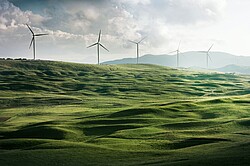
In cooperation with the LUBS Center for Research and Cooperation the European Innovation Alliance presented six digital Brown Bag Sessions from March to June 2023. All online and in English.
You missed a lecture? No problem - check it out in our EuroInnA-Mediathek!
| Topic | Lecturer | Join the session! | |
29th of March, 2023 12:30-13:15 | Minna Keinänen-Toivola, Satakunta University of Applied Sciences, Finland | https://hwg-lu-de.zoom.us/j/9358367680 Meeting-ID: 935 836 7680 | |
12th of April, 2023 12:30-13:15 | Universidad de Huelva, Spain | https://hwg-lu-de.zoom.us/j/9358367680 Meeting-ID: 935 836 7680 | |
26th of April, 2023 12:30-13:15 | Universidad de Huleva, Spain | https://hwg-lu-de.zoom.us/j/9358367680 Meeting-ID: 935 836 7680 | |
10th of May, 2023 12:30-13:15 | "Strengthening rural environmental resilience via landowner´s activisation" | Tomas Bata University, Czech Republic | https://hwg-lu-de.zoom.us/j/9358367680 Meeting-ID: 935 836 7680 |
24th of May, 2023 12:30-13:15 | “Electricity Market Design” | Prof. Dr. Nikolas Wölfing, Ludwigshafen University of Business and Society, Germany | https://hwg-lu-de.zoom.us/j/9358367680 Meeting-ID: 935 836 7680 |
14th of June, 2023 12:30-13:15 | “Sustainable freight transport systems: How can existing technologies help to make logistics more sustainable?” | Prof. Dr. Joachim Schmidt, Ludwigshafen University of Business and Society, Germany | https://hwg-lu-de.zoom.us/j/9358367680 Meeting-ID: 935 836 7680 |
Session 1: "Sustainability in Maritime Logistics", March 29 at 12:30
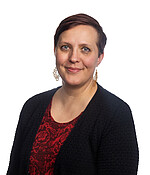
Maritime logistics is a global business. Sustainability of Maritime Logistics consists of economical, environmental and social aspects. In the presentation, applied research work at Maritime Logistics Research Center, SAMK is presented with many practical examples on sustainability.
Adj. Prof. Minna Keinänen-Toivola (PhD) is a Head of Research at Maritime Logistics Research Center, Satakunta University of Applied Sciences (SAMK) in Finland. She has studied environmental aspects for more than 20 years.
Join the Zoom-Meeting here: https://hwg-lu-de.zoom.us/j/9358367680
Meeting-ID: 935 836 7680
Session 2: "The impact of CO2 reduction on the economy", April 12 at 12:30
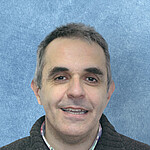
This talk analyzes the evolution of CO$_2$ emissions in the European Union during the period 1995-2015, using an extension of the Kaya identity and the Logarithmic-mean Divisia index (LMDI). To such end, it is used the extension of the Kaya identity.
I will pay special attention to the driving forces that conform the CO2 emissions in this model, namely, population, gross domestic product (GDP) per capita, energy intensity and matrix energy. The results obtained for the 27 member states are quite diverse and do not show a common trend. However, there are certain common features, namely, the main factor inducing the increase of CO2 emissions is the increase of the GDP per-capita, however, the energy intensity is the main force that leads to a reduction of CO2 emissions, even more intensively that the contribution of renewable energies through the change of the matrix energy.
Jose-Enrique García-Ramos is Director de Investigación and a full professor in Physics at the University of Huelva (Spain). His research lines are, on the one hand, the study of the structure of the atomic nuclei or the so called Quantum Phase Transitions but, on the other hand, the connection between economic development and CO2 emissions.
Join the Zoom-Meeting here: https://hwg-lu-de.zoom.us/j/9358367680
Meeting-ID: 935 836 7680
Session 3: "The integration of green hidrogen in the energy industry", April 26 at 12:30
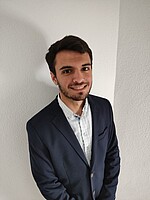
The need to adopt climate policies that contribute to reducing, as far as possible, carbon emissions into the atmosphere is leading European governments to make a strong commitment to renewable energies. However, renewable energies such as wind and solar power are highly dependent on unpredictable weather, so energy storage systems are needed to store excess energy (i.e. energy that is not needed) produced by renewable energies in order to use this energy when necessary. In this strategy, green hydrogen (produced by renewable energies) plays a fundamental role, both for its environmental advantages (it has no associated carbon footprint) and its calorific value (2.78 times higher than that of gasoline, 2.8 times that of diesel and 3 times that of natural gas), which make it the ideal candidate to lead the decarbonization of the economy and be integrated into industry.
Jesús Rey Luengo (PhD student in Industrial and Environmental Science and Technology) is a physicist with a master's degree in Renewable Energies and Energy Sustainability. He currently works at University of Huelva, at the Research Center CITES. His research interests are the study of the profitability of projects based on green hydrogen.
Join the Zoom-Meeting here: https://hwg-lu-de.zoom.us/j/9358367680
Meeting-ID: 935 836 7680
Session 4: "Strengthening rural environmental resilience via landowners` activisation", May 10 at 12:30
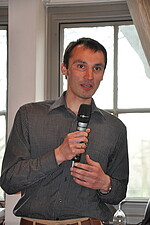
Municipalities and individual landowners are important players of agricultural land management in the Czech Republic. However, municipal political representation as well as individuals rarely works with this property strategically, i.e. beyond the scope of lease (rent). Nevertheless, agricultural land has significant potential in a number of areas whose importance far outweighs the profit from leasing. These include the ability of the land to retain water and thus protect the community from floods as well as droughts; the reduction of dust in the inner city; the enhancement of biodiversity around the villages; the contribution to recreational use of the immediate surroundings of the village and many others. We will introduce the perspectives of farmland owners, the opportunities and responsibilities that such ownership offers and, last but not least, practical guidance on how to make land not only a means of production but also a provider of public goods in the context of failing EU agricultural policies.
Jiří Lehejček (PhD in Forest Ecology) has been an Assistant Professor at the Department of Environmental Security at Tomas Bata University in Zlin. He is the leading advisor of the European Environmental Agency in the European Topic Center for Sustainable Transition. His research interests are landscape management and the adaptation of forests to global change.
Join the Zoom-Meeting here: https://hwg-lu-de.zoom.us/j/9358367680
Meeting-ID: 935 836 7680
Session 5: “Electricity Market Design", May 24 at 12:30
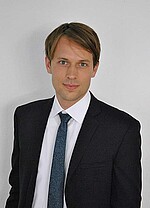
The recent turmoil in European energy supply has led to a debate about the established market design for electric power. Despite calls for a substantial reform by it’s own President in 2022, the European Commission lately proposed a more gradual evolution of the current design, rather than a fundamental change. This talk will provide a glance on the different stages of wholesale power trading in Europe and on the economics of power market design in light of the proposed reform.
Prof. Dr. Nikolas Wölfing, professor of Economics
Join the Zoom-Meeting here: https://hwg-lu-de.zoom.us/j/9358367680
Meeting-ID: 935 836 7680
Session 6: "Sustainable freight transport systems", June 14 at 12:30
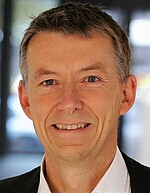
“Sustainable freight transport systems:
Can existing technologies help to make logistics more sustainable?”
Road freight transport is projected to increase by around 40% by 2030. Already today, there are huge negative impacts of road transportation like air pollution, CO2 emissions or congestion on highways. A complete shift to other, more sustainable transport modes, like rail or barge, is not realistic option for a major part of the road freight. It is very uncertain, that alternative fuels or electric powered heavy trucks will be widely in use by 2030. Therefore the improvement of efficiency across the whole transport chain and the optimal use of current technologies have to be taken into account to increase efficiency and simultaneously make transportation more sustainable. The presentation will analyse how existing technologies in combination with digital technologies can make freight transport systems more sustainable.
Prof. Joachim Schmidt is head of Institute of Logistics and full professor at Ludwigshafen University of Business and Society. His research interestes are sustainability in supply chain design and operation and digitalisation of the transport industry.
Join the Zoom-Meeting here: https://hwg-lu-de.zoom.us/j/9358367680
Meeting-ID: 935 836 7680
